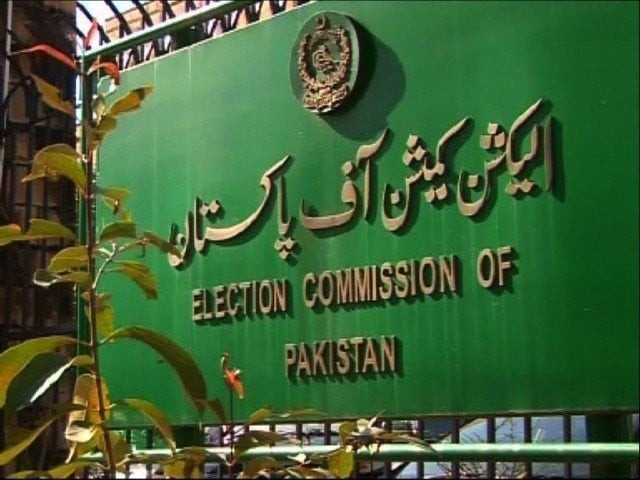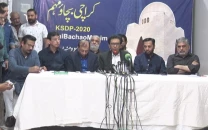PML-N, PPP, MMA issued show-cause notices for not giving 5% tickets to women candidates
ECP directs six political groups to submit replies within 15 days

PHOTO:FILE
The Pakistan Muslim League-Nawaz (PML-N), Pakistan Peoples Party Parliamentarians (PPP-P), Muttahida Majlis-e-Amal (MMA) that had been ruling the country in the past are in the list of parties that failed to fulfil the legal formality during July 25th general elections.
In the election laws passed by parliament last year, it was made mandatory for all political parties participating in the elections to give at least five per cent tickets to women candidates on general seats.
Interestingly, the PPP-P that was originally the mover of the clause which was later incorporated in the Election Act, 2017, also failed to meet the criteria.
Other parties include Pakistan Tehreek-e-Insaf-Nazriyati (PTI-N), Pakistan Rah-e-Haq Party and Tehreek-e-Labbaik Pakistan also did not fulfil the requirement and their heads have been issued the notices.
Low women turnout: ECP holds notification for PK-23
"The Hon'ble Competent Authority has been pleased to direct the undersigned to serve you show cause notice in respect of failure of your party to award 5% tickets to female candidate in compliance with the of Sections 206 of the Elections Act, 2017. Therefore, you are hereby directed to show cause as to why under the law be not taken against you," reads the show cause notices addressed to heads of these parties.
ECP has directed the parties to submit replies within 15 days of the receipt of the show-cause notices.
Interestingly, the law is silent what action the ECP can initiate against such parties. At the time of election, the ECP had asked political parties to send the list of female candidates they had fielded on directly-elected seats. Hardly, any party replied to the ECP directives.
Despite the enactment of law making it mandatory for political parities to award tickets to female candidates, the number of women lawmakers in the National Assembly on general seats this time was lowest in the last two decades.
A total of 183 women contested elections against 272 general seats in the National Assembly. Out of them only eight could secure victory.
Women lawmakers returned to the National Assembly this time, is lowest since 2002.
The country had first direct elections in 1970. There was no quota of reserved seats for women in the polls in the 1970 elections. Nine women contested on the general seats, none of them could win a seat.
Hence there were no women representation in the National Assembly that later passed the 1973 Constitution after the dismemberment of East Pakistan.
To encourage women representation in the National Assembly, 10 reserved seats for women were introduced from the 1977 election through a sunset clause in the Constitution. The clause required that the reserved seats be abolished after 10 years or three electoral cycles.
In the 1977 elections, for the 216-member National Assembly only one woman contested on the general seat that she won. Another 10 returned to the National Assembly on reserved seats. They constituted 5.1 per cent women strength in the house.
Women reserved seats in the National Assembly were increased to 20 in the 1985 non-party elections organised by the military regime of Gen Ziaul Haq. Another 15 women contested on the general seats, only one could win, taking women's strength to 21 or 8.9% of the total strength in the 237-member house.
PML-N, PPP, others served notice over failure to ensure female representation
In the 1988 general elections, 16 women contested on the general seats. Three of them, including Benazir Bhutto who was elected first women prime minister of the country, won.
Accumulated strength of women in the 237-member National Assembly was 23 that accounted for 9.7 per cent of the total strength of the house.
On the expiry of the sunset clause after three electoral cycles-1979, 1985 and 1988, the quota of reserved seats for women stood abolished.
Twelve women contested elections on general seats in the 1990 general elections for the National Assembly. Only two of them could win the polls. This reduced the women representation in the National Assembly to only 0.9 per cent.
In the 1993 general elections, 14 women participated on general seats but only four stood victorious. They constituted 1.8 per cent of the total strength of the house. Similarly, in the 1997 general elections 35 women participated on general seats -- five won.
After the 1999 military coup, Gen Pervez Musharraf reintroduced 60 reserved seats for women in the National Assembly by amending the Constitution through what was tagged the Legal Framework Order.
In the general elections held in 2002, 57 women contested on general seats and 13 of them won. With 60 reserved seats, the National Assembly had 74 women members which was 21.6 per cent of the now 342-member lower of house of parliament.
In the 2008 general elections, 64 women contested on general seats, a record 16 won. With 60 reserved seats, 76 women were part of the National Assembly constituting 22.2 per cent of the total membership of the house.
In the 2013 general elections, out of 161 women contesting on general seats for the lower house of parliament, only nine would win. This reduced the women strength to 70 or 20.5 per cent in the National Assembly that completed its five-year term on May 31st this year.
In the last general elections, though a total of 183 women contested on directly-elected seats, only eight could win. With 60 reserved seats their collective representation is 68 in the National Assembly.
PPP leads with three women lawmakers on general seats, followed by the PTI's two, and one each of the PML-N, GDA and BAP.



















COMMENTS
Comments are moderated and generally will be posted if they are on-topic and not abusive.
For more information, please see our Comments FAQ